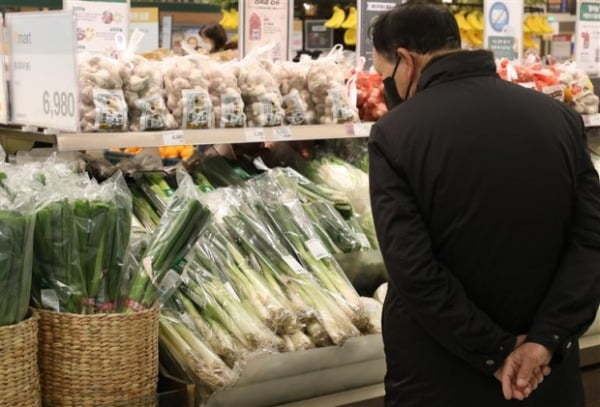 |
A man shops in the produce section at a local market in Seoul. (Yonhap) |
South Korea’s food prices increased at the fourth-highest rate among members of the Organization for Economic Cooperation and Development in January, largely due to a supply shortage brought on by bird flu, according to data and market experts Monday.
January’s prices for groceries and nonalcoholic beverages soared by 6.5 percent on-year, more than twice the OECD average of 3.1 percent, data compiled by the OECD and Statistics Korea showed.
Among the 37 OECD member states, steeper increases were seen only in Turkey, Chile and Iceland, which recorded price rises of 18.1 percent, 7.8 percent and 6.7 percent, respectively.
In February Korea’s food price inflation rate posted an even higher figure, 9.7 percent. It was the fastest gain since August 2011, when food prices rose 11.2 percent.
The latest food price hike came amid a decline in the production of agricultural goods triggered by a highly pathogenic strain of bird flu, experts said.
“A desirable situation that we expect is where food prices increase on the back of surging consumer demand as a result of economic recovery.
However, recent price hikes were led by pressure from the supply side due to the outbreak of bird flu,” said Jung Kyu-chul, economic outlook director at the Korea Development Institute.
According to Statistics Korea, chives increased in price by a record 227.5 percent last month from a year earlier, the sharpest gain since May 1994, when they rose 291.4 percent. Egg prices advanced 41.7 percent on-year, while the cost of apples, red pepper flakes and pork all jumped in the same month -- 55.2 percent, 35 percent and 18 percent, respectively.
Affected by these on-year price hikes, the consumer price increase rate rose from 0.6 percent in January to 1.1 percent last month.
Meanwhile, Jung of KDI forecast that food prices would rise slightly between April and May if the price of petroleum products increased, but said there was a limited possibility that inflation would rise sharply in the short term as supply shortages of farm products would ease in the spring.
By Choi Jae-hee (
cjh@heraldcorp.com)








